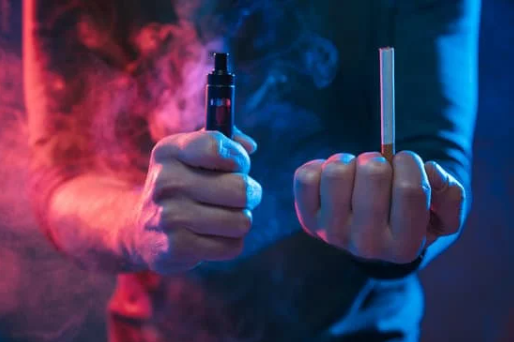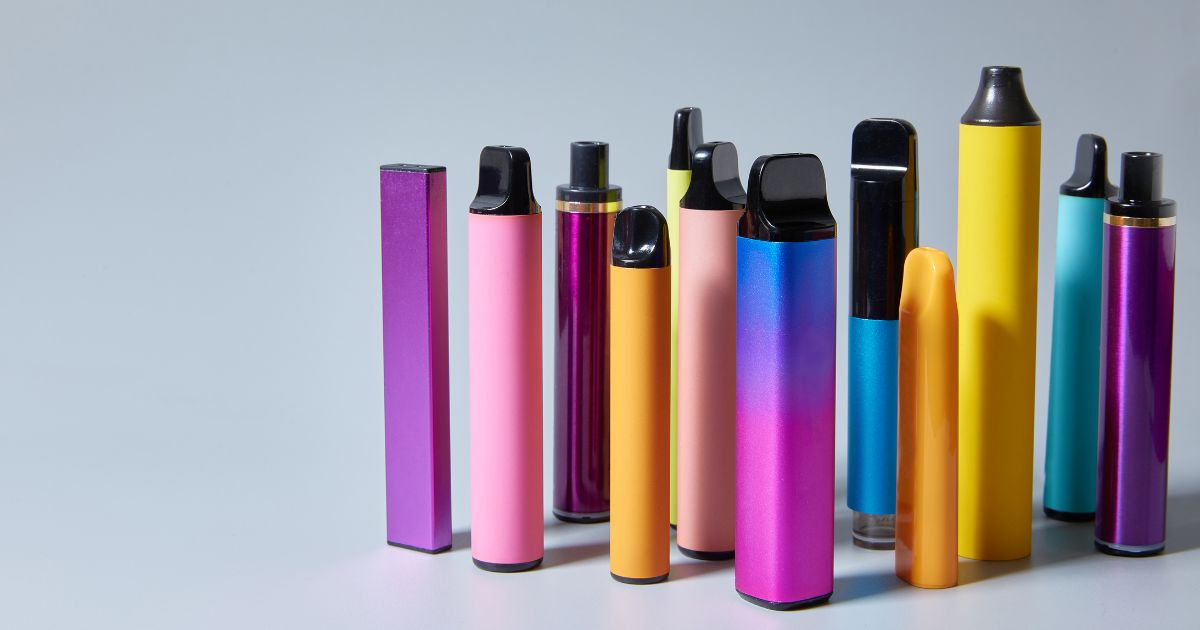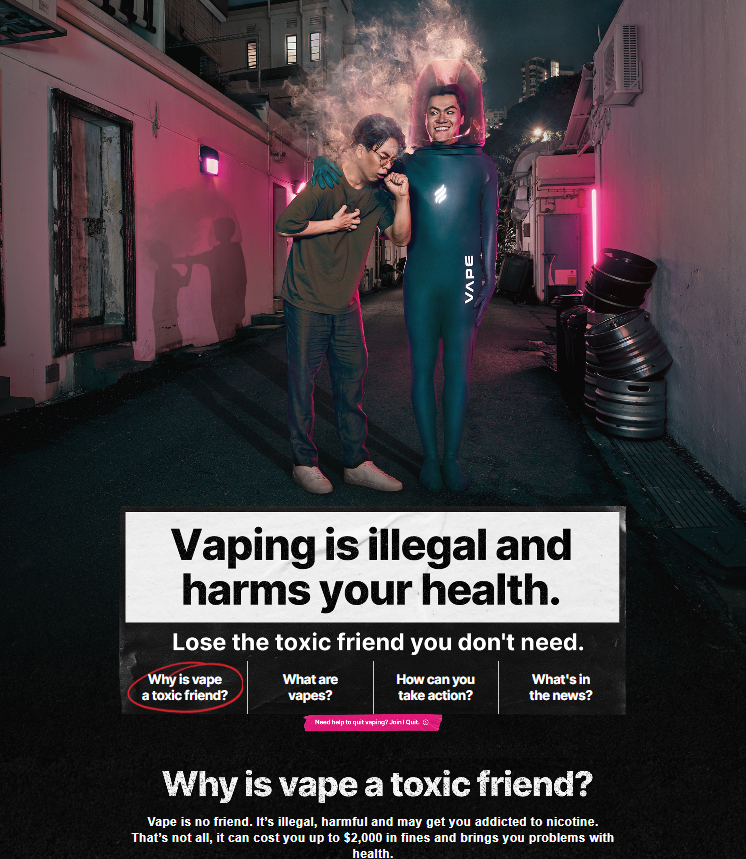Vapes or e-vaporisers, which are e-cigarettes, have become rather popular among today’s youths.

According to this article by The Straits Times, a disposable vape costs about $30 and can last for roughly 5,000 puffs. Non-disposable ones may cost about $60, and a set of three pods, each lasting for about 500 puffs, costs $17.
The growing popularity of vapes can be attributed to the fact that many teens believe vaping is less harmful than smoking.
While vapes are known to contain fewer toxic chemicals than the average cigarette, they still contain harmful chemicals such as fine particulate matter, cancer-causing agents like carbonyls, and volatile organic compounds such as formaldehyde and benzene.
Vapes are often packaged in colourful and sleek forms with sweet and fruity flavours like mango, strawberry, and grape, to mask their health risks, making them “pretty” and “cool” to youths.

Vapes also dispense nicotine, which is a highly addictive substance.
Apart from health risks like increased heart rate and elevated blood pressure, nicotine exposure during adolescence can have permanent effects on impulse control, and may lead to mood disorders.
More details about the harms of vapes can be found here and here.

Because of its many adverse effects, Singapore has been really cracking down on vape in recent years.
Vaping was banned in Singapore in 2018.
Vaping In Singapore’s Schools
Already, about 250 vaping cases were referred to the Health Sciences Authority (HSA) by schools and institutes of higher learning (IHL) in the first quarter of this year.
That’s about 25 cases per week.
In October last year, Second Minister for Education Maliki Osman said 800 students from schools and IHLs were caught vaping in 2022. Pre-COVID-19, the number of students referred to HSA for vaping offences was less than 50.
Maybe people got bored after making their 100th dalgona coffee during circuit breaker and turned to vaping?
In response to the recent high number of vaping cases in schools, the Ministry of Health (MOH) and the Health Sciences Authority (HSA) released a joint press statement on 9 April to address the issue.
Students caught for vaping offences for the first time may be fined up to $2,000, in line with penalties for people convicted of buying, possessing, and using e-vaporisers.
Better tell your friend to stop vaping ah.
The Ministry of Education (MOE) will also be notified when students are caught by HSA or other enforcement agencies outside school settings for vaping offences.
HSA and MOH said “For students who are caught vaping, in addition to the penalty imposed by HSA, schools and IHLs will continue to mete out consequences through existing disciplinary frameworks, such as suspension or caning (for boys in schools).”
“Students caught vaping will also be placed on cessation support programmes where counsellors will guide them through their cessation journey.”
The authorities said institutes of higher learning have been reviewing sanctions, which include corrective work orders or mandatory community service.
Students from autonomous universities who are caught possessing or peddling vapes may also have their hostel privileges revoked.
Schools and IHLs will continue their regular detection and enforcement efforts through internal reporting channels and campus patrols, said HSA and MOH.
Where appropriate, HSA and autonomous universities will also carry out joint operations.
Addressing Vaping In Schools
While the $2,000 fine is new, there have already been many measures put in place to counter vaping among students.
For the past few years, schools have been taking disciplinary action against students caught vaping.
In most schools, those caught vaping for the first time would be issued a warning and their parents would be informed.
Repeat offenders were subjected to detention or even suspension, as well as caning for boys.
Last December, CNA reported that some youths were starting to pick up the habit of vaping from as early as primary school, with sellers targeting younger people.
This alarming news is probably why the $2,000 fine for students was announced, though I don’t think most primary schoolers have $2,000 just sitting around.
To combat the growing popularity of vaping amongst Singapore’s youths, schools and IHLs have been working with the Health Promotion Board to “amplify anti-vaping messages” in educational materials and preventative programmes.
Posters have been pasted in schools, warning students against vape.

Students caught vaping are provided support via programmes such as QuitLine, a tele-counselling service, as well as on-site counselling by Student Health Advisors.
Through these sessions, students not only learn about the detrimental effects of smoking and vaping, but also pick up ways to quit and manage withdrawal symptoms in healthy ways.
Around 2,350 youths took part in these programmes last year, of which 38% have either reduced or quit smoking and/or vaping one month after counselling.
Vaping In Singapore
The number of people who have been caught for vaping-related offences in Singapore is not little.
A total of 7,600 vape-related offences were recorded in 2021, followed by 5,600 in 2022.
In 2023, this number jumped by 43% to 8,000 vaping-related offences.
In the first quarter of this year, over 2,200 people were caught for the possession and use of e-vaporisers.
This year, HSA succeeded in disrupting a number of illegal vape distribution networks, seizing more than $7 million worth of vapes and components in total.
Enforcement At The Borders
In a shocking move last April, Malaysia effectively legalised vaping. Additionally, after the government exempted nicotine liquids and gels from the Poisons List in order to tax vaping products, minors in Malaysia have been able to buy vapes without any prohibitions in place.
Joint operations have been conducted by HSA and the Immigration and Checkpoints Authority (ICA) at Woodlands and Tuas checkpoints and Changi Airport to detect and deter attempts at smuggling vaping products through Singapore’s borders.
The first quarter of this year saw 40 vape-related cases being detected at the borders during joint operations.
10 people were caught smuggling vapes into Singapore, while 30 were found to be in possession of vapes.

One of the smugglers has been prosecuted and the rest are pending prosecution and enforcement actions, said MOH and HSA.
Enforcement In The Community
Between 1 January and 31 March 2024, about 1,950 people were caught for possession or use of vapes in public areas, such as the central business district, entertainment outlets and around shopping centres.
34 people, aged between 20 and 43 years old, were convicted in Court between October 2023 and March 2024 for selling vapes and related components in Singapore.
The total fines amounted to around $340,000, and one was sentenced to 10 months’ jail on 1 February 2024, the longest jail sentence ever handed out for vape-related offences.
Warehouse Raids
During a warehouse raid in March last year, authorities seized a record haul of 85,000 products.
In January this year, authorities seized another 81,000 vapes and related components worth a total of over $1.1 million during a warehouse raid at 31 Woodlands Close.
Five people aged 19 to 39 years old are assisting in the investigations.
Penalties For Vape-related offences in Singapore
The possession, use, or purchase of vapes carries a maximum fine of $2,000.
It is also an offence to import, distribute, sell, or offer for sale e-vaporisers and their components.
Any person convicted of an offence is liable to a fine of up to $10,000, or imprisonment of up to six months or both for the first offence, and a fine of up to $20,000, or imprisonment of up to 12 months or both for the second or subsequent offence. All prohibited tobacco items will also be seized and confiscated.
Members of the public who have information on the illegal possession, use, purchase, import, distribution, sale or offer for sale of vapes can contact HSA’s Tobacco Regulation Branch at 6684 2036 or 6684 2037 during office hours (9:00am to 5:30pm, Monday to Friday).
Information pertaining to prohibited tobacco products in Singapore is available on the HSA website and more details about the harms of vaping can be found on HealthHub. Persons who need help to quit vaping can join the I Quit programme.




